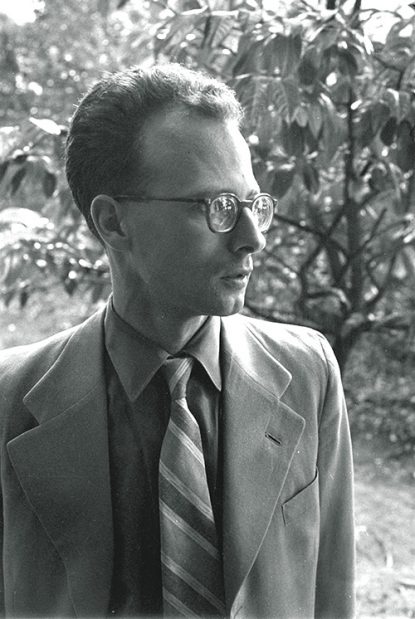
Hans-Ruedi Weber (1923–2020)
World traveler for the WCC, missionary who combined art and biblical interpretation

“Bible study cannot focus on the Bible only as a literary document, but also as an oral tradition in storytelling and singing, as drama in worship and in symbolic acts, as a visible word through art, and as a source of meditation.”
Hans-Ruedi Weber was born in 1923 in Ruchwil, Switzerland. After being ordained a Reformed pastor in 1947, Weber had served as a missionary in Central Celebes and East Java. He obtained a doctorate in theology from the University of Geneva in 1966.
During his many years of service at the WCC Weber took up a number of important positions, he served as director of the department on the laity (1955-61), associate director and professor at the Ecumenical Institute Bossey (1961-71), and director of biblical studies (1971-88).
In his work with the WCC, Weber travelled throughout the world to support the biblical work of churches in very diverse contexts and situations. In 1961, Weber accompanied Lesslie Newbigin to the Malua Assembly as a young missiologist. In November 1984 Weber visited Samoa for ten days as moderator of the WCC Task Force in an attempt to heal the resentments between the Congregational Christian Church in American Samoa and Congregational Christian Church in Samoa after the separation of the two churches in 1980. “He came with new liturgical and Bible study materials,” Agnès Abuom, moderator of WCC’s Central Commitee said. “His face always glowed with joy as he either travelled to one of the islands or when he came back.”
One of Weber’s best known books was “On a Friday Noon: Meditations under the Cross”, which matched artworks related to the crucifixion with biblical reflections, and was translated into different languages. Another widely-circulated book, “Experiments with Bible Study”, introduced readers and church groups to ways of getting to know the scriptures through music, drama and images. Among Weber’s other publications are “The Book That Reads Me: A Handbook for Bible Study Enabler” (1995), “A Laboratory for Ecumenical Life: The Story of Bossey” (1996), “The Militant Ministry (1963), and “Power: Focus for a Biblical Theology” (1989). After retirement from the WCC in 1988, Weber taught at the Pacific Theological College in Suva, Fiji.
“His strong convictions for the oikoumene were: a passion for the world, the oikoumene, which is God’s first love and where God is at work through judgement and salvation. The search for a fuller obedience to the biblical faith in order to receive direction for the churches‘ prophetic calling to work for reconciliation, and a fostering of an ‘ecumenical con-spiracy,’ a common spirit and vision, fighting against divided, self-sufficient church life and working for a more credible witness and service in the world. That task is hopefully still at the heart of the oikoumene, though today we may translate it in other words.” Baldwin Sjollema, director of the WCC’s Programme to Combat Racism
“Weber leaves behind a solid legacy to the one ecumenical movement, for which he showed great passion. He guided hundreds of Christians in developing their own gifts and skills for empowering groups, small and large, so that together they could have a deeper encounter with the biblical message,” Rev. Prof. Dr Ioan Sauca, WCC interim general secretary, wrote in his obituary.






